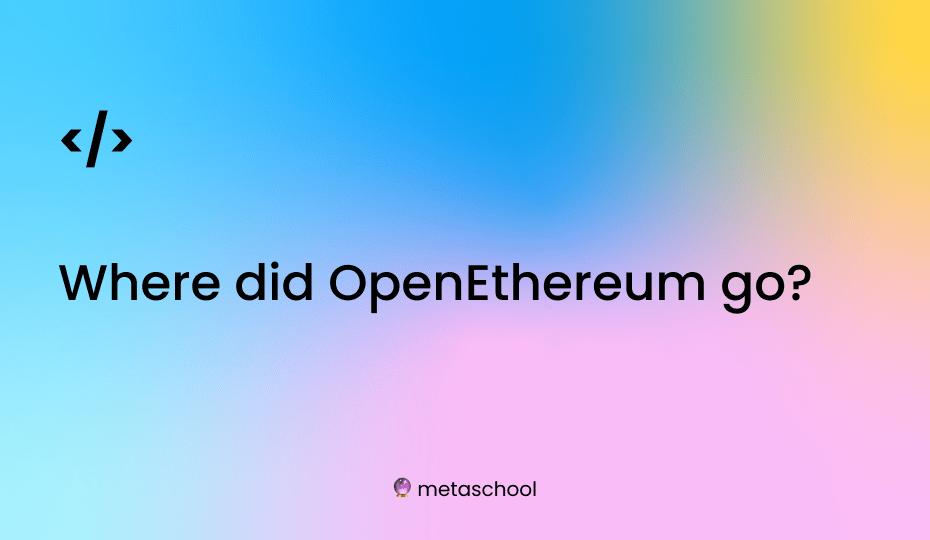Table of Contents
OpenEthereum was a popular open-source Ethereum client that was used by many in the Ethereum network. Built on the Rust programming language, it was known for its fast and efficient performance. However, the team behind OpenEthereum shut down in 2021.
Wait, what was OpenEthereum?
Let’s take a closer look at what OpenEthereum was and why it was so well-regarded by its users. OpenEthereum was a full-node implementation of the Ethereum protocol, meaning that it enabled users to participate in the Ethereum network by validating transactions and blocks. It was known for its high-speed performance, which made it a favorite among developers and users alike.
However, despite its popularity, the team behind OpenEthereum decided to shut down the project. This decision was not taken lightly, and the team has cited several reasons for their decision. In the following sections, we will explore these reasons and discuss their implications for the Ethereum community.
Why OpenEthereum closed
The team behind OpenEthereum has cited several reasons for their decision to shut down the project.
1. Increased competition in the Ethereum client space
Over the past few years, several other Ethereum clients have emerged, including Geth and Parity, which have gained significant traction among users. This increased competition has made it difficult for them to maintain their user base and secure funding for the project.
2. Changing landscape of the Ethereum ecosystem
The Ethereum network has undergone significant changes since OpenEthereum was first released, including the implementation of new protocols and standards. This made it increasingly difficult for the team to keep up with these changes and maintain their client’s compatibility with the latest Ethereum features.
3. Lack of resources
Despite their best efforts, the team was unable to secure sufficient funding to continue development and support of OpenEthereum. This led them to the difficult decision to shut down the project and focus on other endeavors.
Overall, it seems that a combination of increased competition, changing technological landscape, and lack of resources contributed to the decision to close shop. This decision was undoubtedly disappointing for the many users who relied on them for their Ethereum needs, but it was a necessary step for the team to move forward.
Impact of closure
The closure had a significant impact on the Ethereum community. As a popular Ethereum client, OpenEthereum was used by many individuals and organizations to participate in the Ethereum network. Its closure did leave a gap in the ecosystem, and users eventually found an alternative solution for their Ethereum needs.
1. On developers
Affected most were developers who used the client to build and test their Ethereum-based applications. Without OpenEthereum, these developers had to find alternative solutions for running a local Ethereum node, which could impact their ability to quickly and easily develop and test their applications.
2. On security of the Ethereum network
OpenEthereum was a full-node implementation of the Ethereum protocol, meaning that it helped to validate transactions and blocks on the network. With fewer full nodes, the network may become more centralized, which could potentially compromise its security and decentralization.
Overall, the closure of OpenEthereum had a significant impact on the Ethereum community. While there may have been some challenges and disruptions in the short term, it is hoped that the community will be able to adapt and find alternative solutions to continue to thrive and grow.
Alternatives presented for users
For users of OpenEthereum, the closure of the project led them to finding alternative solutions for their Ethereum needs. Fortunately, there are several other Ethereum clients that users now choose from, including Geth and Parity.
Geth is a popular Ethereum client that is written in the Go programming language. It is known for its robustness and reliability, and it is used by many. It offers many of the same features as OpenEthereum, including support for running a local Ethereum node, mining, and participating in the Ethereum network.
Parity is another popular Ethereum client that is written in the Rust programming language, like OpenEthereum. It is known for its fast performance and efficient operation. Additionally, Parity offers support for Ethereum Classic, a fork of the Ethereum blockchain, which may be of interest to some users.
Overall, for users of OpenEthereum, switching to Geth or Parity was likely a relatively straightforward process since they could be easily installed and configured to meet the needs of individual users.
Moving on…
While the closure presented challenges and disruptions in the short term, the Ethereum community was able to adapt and continue to thrive and grow. There are several other Ethereum clients chosen, including Geth and Parity, which offer similar features and support for the Ethereum network.
Finally, them closing down is a reminder of the dynamic and constantly evolving nature of the blockchain and cryptocurrency space. While it was disappointing to see a popular project come to an end, it is also an opportunity for the Ethereum community to continue to innovate and move forward.
Is OpenEthereum deprecated?
Recently, as of 2021, OpenEthereum announced that they will be deprecated and that they will be succeeded by a new one in collaboration with the team at Erigon. This was to ensure faster transactions, better, more efficient and more secure experience. In May, 2022, with the Ethereum Merge, the OpenEthereum support officially ended. The news came from the official Twitter account of OpenEthereumOrg.
Who controls Ethereum nodes?
In May 2022, Ethereum pivoted to the Proof-of-Stake consensus mechanism. Before that, miners used to be responsible for controlling the Ethereum nodes. After the Merge, Ethereum still remains divided when it comes to power. As per its new consensus mechanism – Proof-of-Stake – it is the validators that now control the Ethereum nodes.
